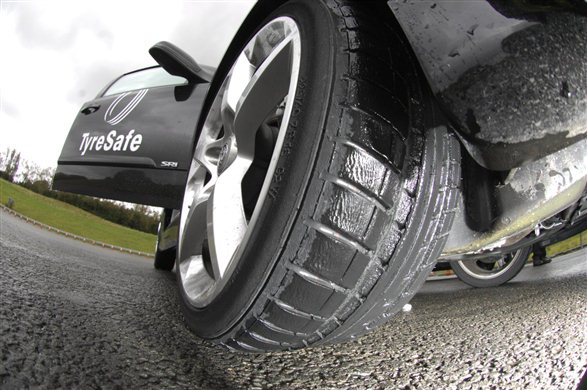A new study by campaign group TyreSafe and Highways England has highlighted the hidden danger of UK motorists continuing to drive on tyres which do not meet legal requirements.
Over a quarter of drivers surveyed had at least one tyre on their vehicle which did not meet the legal requirements by the time it was replaced, a revelation which suggests almost 10 million illegal and potentially dangerous tyres could be in use on UK roads during 2015. That figure equates to up to one in four of the UK’s 35.3 million cars and LCVs being driven on the public road with an illegal tyre during this year.
The data came from studying over 100,000 tyres changed at selected tyre retailers between February and May of this year, which revealed the startlingly high number that were already below the legal minimum tread depth of 1.6mm when they were replaced.
With tyre condition playing a decisive role in vehicle braking and steering, especially in adverse weather conditions, TyreSafe have called on UK motorists to become more aware of the state of their tyres to avoid falling foul of the law, or worse suffering a potentially avoidable accident. The survey found that a significant number of drivers do not carry out regular checks on the condition of their tyres, and as a result were oblivious to the fact that they were perilously close to the legal minimum tread depth.
As an easy-to-remember guide, TyreSafe is calling on drivers to ‘ACT’ – Air pressure, Condition, Tread. Ensuring the tyre’s air pressure is correct as per the vehicle’s owner’s manual reduces fuel consumption, tyre wear, and the risk of losing control of the vehicle. Condition is important as tyres with signs of irregular wear or damage such as cuts, lumps, or bulges are more prone to a dangerous rapid deflation.
Tread depth must, by law, be at least 1.6mm across the central three-quarters of the tyre’s breadth around the full circumference of the tyre. A simple tread check is to use a 20p coin – inserted into the main grooves of the tyre you should not be able to see the outer band of the 20p coin. If you can, the tread depth may not meet the required minimum and the tyre should be checked by a qualified tyre specialist. Driving with a tyre which is illegal not only impacts on the amount of control you have, it can also impact heavily on your wallet with potential fines of up to £2,500 and three penalty points for each one which does not meet legal requirements.
Stuart Jackson, Chairman of TyreSafe, said: “TyreSafe does not believe millions of drivers are intentionally putting others at risk - it is more a question of educating motorists to take responsibility for their safety and that of others on the road.”
“As vehicles have become increasingly reliable, owners have become less used to performing what were once considered basic precautionary checks before setting off on a journey. Tyres too are much more technologically advanced but they do wear and can get damaged so it is down to the driver to regularly check they’re safe."
“The evidence provided by the TyreSafe survey underlines what we already feared - awareness among Britain’s motorists’ of the importance of tyre safety urgently needs to improve.”
Click here to sign up for our monthly newsletter
Popular news stories
 |
 |
 |
 |
|||
|
|
||||||








